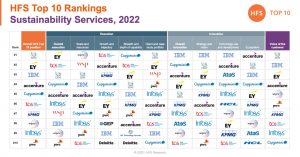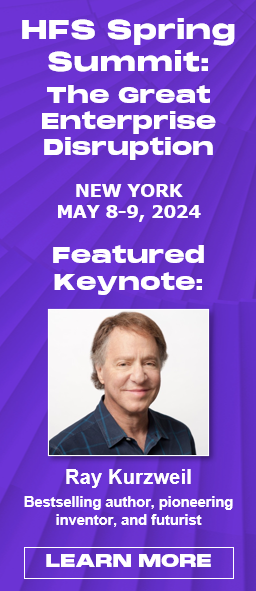
Sustainability is a massive problem involving multiple interconnected factors – literally, everything happening everywhere links to it in major or minor ways. Those systems need to align rapidly to the global context.
Consulting, technology, and services firms sit at the center of these vast systems. The leaders have realized the scale of impact they can have from that center. They are addressing their own organizations’ sustainability—but more importantly, they are doing so with their clients and partners. They use their networks to drive the level of collaboration and alignment we need. They can scale best practices and solutions.
The leading providers of sustainability consulting, technology, and services in this report influence and help to transform organizations, industries, systems, and governments, which must all build and execute transition plans that align towards decarbonization and every other environmental, social, and governance factor underpinning the UN Sustainable Development Goals.
I sat down with Josh Matthews (you can see him above speaking at COP26 in Glasgow last November), our Practice Leader for sustainability, to dig into the results of this new research.

To download a copy of the report, please click here.
Phil Fersht, CEO and Chief Analyst, HFS Research: Firstly, Josh, how does HFS define “sustainability” these days… has your attitude / focus towards the whole sustainability topic shifted since you started writing about it for us in pre-pandemic times?

Josh Matthews, Practice Leader, HFS Research: Sustainability has to include all environmental, social, and governance (ESG) elements. Companies, governments, industries, and entire ecosystems need to build and align roadmaps under the global sustainability context: that means reducing emissions to zero (or at worst) net-zero by 2050 (or ideally as soon as possible) and addressing all the other ESG factors underpinning the 17 UN Sustainable Development Goals (SDGs). These roadmaps have to start at the systems level and break down to day-to-day operations in organizations. The most ambitious and influential organizations in their ecosystems will be the ones to drive collaboration and alignment to this context. I guess we’ll talk about them later on…
But the fact we have goals for sustainability is a massive advantage. Yes, the goals that make up the global context need refinement and detail the transition planning underpinning them (the SDGs are based on this in some detail), but contrast this to the last 10 to 15 years where we all saw organizations chase the vague specter of digital transformation without an endpoint in sight.
Our systems are not good enough to address sustainability. But too many of the most influential firms use this as an excuse for not moving first and bringing their ecosystems with them. There is a glaring opportunity in all industries and ecosystems for organizations and coalitions to set the standard by reinventing business models and loudly disclosing their transition plans. These leaders must show their ecosystems—including competitors and regulators—that addressing the entire global sustainability context is not only competitive but also by far the best environmental, social, and financial option now and in the coming decades. This applies in spades to sustainability consulting, technology, and services firms.
Phil: What has stood out to you most with the service providers, both in terms of where they are delivering value and facing challenges?
Josh: Growth is soaring across sustainability services revenues, headcounts, and clients—we expect approximately 240%, 190%, and 210% growth, respectively, over the next two years. Together, the 18 leading firms in this study account for more than $13 billion, 68,000 employees, and 22,000 clients dedicated to sustainability services. Seventy-five percent (75%) of their clients are located in North America or Europe. Clients are more impressed with execution capabilities versus innovation. Case studies and references proving technical and domain expertise are more vital in winning business for sustainability than in most areas. Maturity is high across the value chain, with net-zero roadmapping, platforms, and ESG reporting as standouts.
More than 80% of organizations don’t have the plans they need to address sustainability internally, let alone influence systems. Employees want to work for firms that act on sustainability and have it embedded throughout the organization. There’s a talent shortage for deep sustainability expertise. The energy, utilities, manufacturing, financial services, and consumer goods industries show the most demand for sustainability services. Given their impacts on sustainability beyond their industry walls, they are critical in addressing the global context. Analytics is the most widely used digital technology for sustainability efforts, followed by cloud and automation. Demand is increasing across the sustainability services value chain from consulting to technology and managed services; supply chain and procurement strategy, net-zero roadmapping, platforms, and ESG reporting stand out. The roadmapping approach must also be applied to social sustainability.
Phil: And who impressed you out of the Top 5 we selected? What sets them apart from the rest, Josh?
Josh: ERM, EY, IBM, Accenture, and Capgemini make up our top 5 overall. The firms that lead the leaders in this study are set to make the most significant impact across the global sustainability context. However, it is not just a token nicety to say we have been beyond impressed with all 18 firms profiled. Most have developed scaled revenues and headcounts, growing at pace with the market. They have broad capabilities across the value chain and beyond. They have large clients and case study pools with examples of deep strategic engagements with the most influential firms poised to change their systems. Their strategies are clear, ambitious, and aligned with the global context. They use a broad range of technologies and IP and have impressive R&D initiatives. Their ecosystems are powerful across partnerships, acquisitions, co-innovation, and global networks. Customer references speak highly.
But specifically on the top 5:
- ERM’s 50+ years of sustainability experience and engagements have set the standards others follow—including writing the TCFD scenario analysis playbook and JP Morgan’s critical Climate Compass methodology to, in their words, “replumb the financial system”. Lord knows we need it. Its “Boots to Boardroom” approach to operationalize full sustainability from strategy through to physical implementation is what many of the other 18 providers are aspiring to.
- EY is setting the strategic direction for sustainability at the C-suite and United Nations levels—including around COP27 this November in Egypt. It has a scaled global practice of 25+ years and a powerful ecosystem stemming from its historic strategy and auditing base.
- IBM’s ambition for just what is achievable as a provider in the center of so many systems stands out. It’s partnership ecosystem is powerful and has potential beyond most; combined with its longstanding technology and innovation really has brought IBM to the global sustainability forefront.
- Accenture has established its sustainability services scale, and its practice is on a steep trajectory from an early-mover position. It also has outspoken ambition throughout global networks. Its ecosystem of partnerships, acquisitions, co-innovation, and these global networks leads the pack.
- Capgemini has a breadth of capability few can match, from business models to physical engineering. Its global leadership spans ecosystems and also international governments. Sustainability is a top-line company priority. Expect Capgemini to challenge for the number one spot in years to come.
Phil: What do you expect to see in this space over the next two years? How are the enterprise needs /concerns shifting and what do service providers need to do to stay ahead of the game?
Josh: The glaring opportunity in sustainability applies to everyone: organizations, policymakers, and the consulting, technology, and services sector. We need them all to meticulously detail how they can and will address the entire global sustainability context on the three key fronts. First is addressing internal sustainability by reducing emissions to zero and tackling all other ESG factors underpinning the SDGs. The second is helping clients address their sustainability by positioning products and services under the global sustainability context. Third, organizations and coalitions with the greatest influence over their ecosystems must move first, prove the commercial models work, and publicly disclose their transition plans. This influence must also drive adaptation-–given the desperate state of climate and ecological breakdown currently being experienced. It is set to get worse. The final element is a call to all at the forefront to be unashamedly ambitious and transparent. Too many are playing not to lose in sustainability. Leaders can help everyone win.
Phil: Finally, Josh, what can we all do as individuals to learn more and make a difference – even baby steps?
Josh: I think this glaring opportunity applies to individuals too. Think about what impact you can have from whatever position you find yourself in—whether that’s daily life or your job. Think about how decisions and work fit under the global sustainability context. (But also, don’t beat yourself up for, say, taking a flight to see a relative or ordering a meal that’s flown from afar… while we can, of course, all play our part… the scale of the systems change we need means that the weight falls on the most powerful).
If your job, say, is a barrier to the impact you want to make, there’s a phenomenal number of opportunities out there. As I said, companies are not only hiring sustainability talent like there’s no tomorrow… a fitting phrase for sustainability and climate change… but are looking to embed sustainability and broader purpose into everything they do… at least the leaders are.
In terms of learning more, I’d suggest How to avoid climate disaster and Net positive as two books that frame the global context and solutions we need well. Also, a shameless plug for our coverage at HFS, both over the past years, the new Top 10, and the upcoming works, talks, and events that will include a refresh of the sustainability services ecosystem map and more market analysis.
Phil: Thanks for your dedication and passion for this critical topic, Josh.
HFS premium subscribers can click here to download our new Top 10 Report: Sustainability Services, 2022
Posted in : Business Data Services, Business Process Outsourcing (BPO), Buyers' Sourcing Best Practices, Consulting, Economics and Geopolitics, Employee Experience, sustainability






